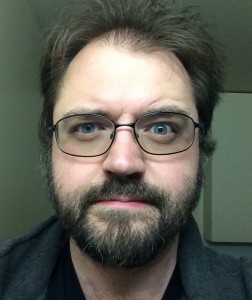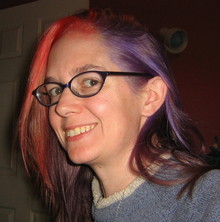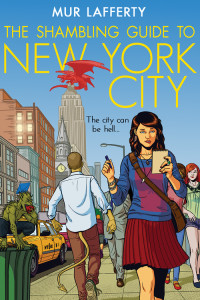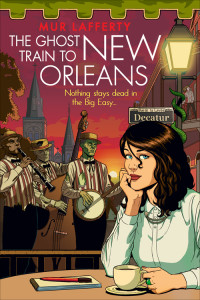interviewed by Carl Slaughter
 Nathaniel Lee puts words in various orders. Periodically people give him money for this. The correlation is weak at best, but present. He lives somewhat unwillingly in North Carolina with his wife, son, and obligatory cats, where he maintains a vague sort of career that provides sufficient money to continue his writing and board game habits. Coincidentally, he is the Assistant Editor of both Escape Pod and the Drabblecast (the posts were each offered independently and without knowledge of the other). As a result, he has read enough stories about penises, serial killers, and time travel. He is also an assistant editor for the humorous anthology series Unidentified Funny Objects. Check out his blog at Mirrorshards where he does Very Short Stories. Exactly 100 words. No more. No fewer. Every day.
Nathaniel Lee puts words in various orders. Periodically people give him money for this. The correlation is weak at best, but present. He lives somewhat unwillingly in North Carolina with his wife, son, and obligatory cats, where he maintains a vague sort of career that provides sufficient money to continue his writing and board game habits. Coincidentally, he is the Assistant Editor of both Escape Pod and the Drabblecast (the posts were each offered independently and without knowledge of the other). As a result, he has read enough stories about penises, serial killers, and time travel. He is also an assistant editor for the humorous anthology series Unidentified Funny Objects. Check out his blog at Mirrorshards where he does Very Short Stories. Exactly 100 words. No more. No fewer. Every day.
CARL SLAUGHTER: HOW EXACTLY DOES ONE WRITE STORIES EXACTLY 100 WORDS?
NATHANIEL LEE: Start writing and stop when you hit a hundred.
No, okay, seriously, flash fiction is a tricky row to hoe because here’s so little space. Microfiction almost always has to sacrifice some of the key “pieces” of a story: plot, setting, character, theme. Sometimes you shade them out in proportion, sometimes you just do away with one altogether (resulting in “character study” or “world fragment” type stories). If you can use tropes and narrative conventions to make your audience fill in the blanks for you, so much the better.
One thing that it will train you to do is absolutely and brutally trim all ornamentation. If there’s a bit of description that’s just pretty words but that doesn’t advance the core concept of the story, you’re going to feel it bulking against you like a two-liter soda in a snow jacket pocket. You’ll learn very quickly what is absolutely necessary to a story. (And sometimes you’ll find that you need those extra words; I’ve had several full short stories that grew from the fact that the 100-word story they started out as was just too cramped a space to explore them or generate their full effect.
HOW EXACTLY DOES ONE ACCOMPLISH THIS FEAT EVERY DAY?
Don’t ask me. I’ve lapsed. ¤śø I’m down to one a week at best, now that we have a toddler, and when I do have energy to write, I’m usually working on salable short fiction. So I guess the answer is: free time.
When I’m alert and rested and ready to be creative, it takes as little as ten minutes for me to polish up a new flitterfic. It’s taken up to and over an hour, though.
WHAT EXACTLY IS YOUR JOB DESCRIPTION AT ESCAPE POD?
WHAT EXACTLY IS YOUR JOB DESCRIPTION AT DRABBLECAST?
At this point, they’re nearly identical. I manage our teams of slushers, making sure they get the stories and give the basic thumbs-up/thumbs-down in a reasonable timeframe, and then I filter the thumbs-up pile down to the 1-5% that make it to the editor’s desk. Other duties include whatever Norm needs me to do at the time, including emergency audio recordings, working with authors on rewrites, pestering people to send me stories I’ve read elsewhere, etc.
WHAT EXACTLY ARE THE DIFFERENCES BETWEEN THESE PODCAST SITES?
Uh, legion? Escape Pod plays it straight; we do science fiction of a fairly middle-of-the-road style, presented as stories read to you by a narrator, with brief intros and editorial comments. Drabblecast is a Weird market, liable to come at you with body horror or high-brow lit-fic or poetry or goofy cartoons, anything and everything that generates that frisson of “wait, what?” that makes a story Drabblecastian. It’s also much more of a show, if you catch my meaning, with Norm’s big personality rampaging all over every segment and putting a personal stamp on everything that happens, a bit like the old late-night movie shows with the colorful hosts. (Yes, Norm, I am explicitly comparing you to Elvira.) I feel like people listen to the Drabblecast specifically because it is Norm’s show. (Basically, Escape Pod has had four editors and at least as many hosts in its run, and they’ve all done a good job and maintained a recognizable show, but if the Drabblecast ever lost Norm, it wouldn’t be the Drabblecast anymore.)
HOW EXACTLY DOES ONE GET CASTED BY THESE PODS?
What, like get your stories on? Uh, well, write a really good story and then send it to us. submissions@drabblecast.org. Advanced players can sell it elsewhere first, since we do a lot of reprints, and thus get paid twice on the same piece.
The other route is to write a story so amazing that when we read it after you have (of course) published it elsewhere, we then hunt you down and demand to give you additional money for it. If you want to make sure we see it, though, best to send it in to the submissions address.
Once we’ve bought a story, we line up a narrator from our stable of volunteers and get an audio file, and then Norm does whatever he does into a microphone and he and Tom chop it up real fine and bring it to a simmer, after which it gets spewed all over the Internet.
WHAT EXACTLY IS YOUR JOB DESCRIPTION AT UNIDENTIFIED FUNNY STORIES?
Unidentified Funny *Objects*, please. (U.F.O. – geddit!?) [ Just testing you. ]
Anyway, for Alex I just do volunteer slushing. He has about a dozen people he uses to help filter and sort stories every year. Also sometimes he buys stories off me. (I assume he doesn’t take my slush feedback on them into account. :-D)
HOW EXACTLY DOES ONE GET PUBLISHED BY THIS ANTHOLOGY?
Twenty dollars, same as in town. (You send it to the submissions address: ufoeditors@gmail.com. Preferably while submissions are open, which they are not. If the money continues to roll in accordingly, I’m sure there will be a fourth installment next year. Try ’em then. :-P)
WHAT EXACTLY GOES ON OVER THERE AT MIRROR SHARDS?
One word, plz. Mirrorshards. [ I knew that. ] And what goes on there is I write flash fiction and post it. Also when a new story of mine comes out elsewhere, I link to it there and update my bibliography, which is a sub-page on the Blogger interface. Real authors maintain actual sites with blogs about their lives and writing habits. I periodically post bizarre surreal snippets and the occasional hyperlink. This is how you can tell I am quality.
WHAT EXACTLY IS/WAS YOUR INVOLVEMENT WITH THE CRITTERS WORKSHOP?
Uh, not much? When I was a wee young author, back in 2008, I joined a bunch of writing workshop groups and found out that most of them are terrible and are full of amazingly bad advice. Critters is a decent site if you need a feedback forum (and I think some fairly major names still use it), but the signal-to-noise ratio is pretty bad because your story is literally sent out to a random subset of the membership, of whom a further subset will decide to read it and critique it. I received some comically bad critiques there and at one point had someone threatening me with physical harm because I did not like his (terrible) story. It’s also very slow; you’re waiting a month or two for a critique unless you have the free time to earn the jump-the-line passes by critiquing a dozen stories a week (which I used to have but no longer do). I eventually found myself treating Critters critiques as an aggregate, where if *everyone* was saying the same thing, I’d look into it as an apparent problem with the story, but on the whole, it’s very hit-or-miss. I did meet some very nice and competent writers there as well, don’t get me wrong. It’s just that once you find a smaller group of folks whose taste you know and trust, I’d rather use that group of reliable beta-readers than trust to the whims of fate and the general Internet population. Additionally, since I now read slush for two magazines, I have a lot less energy and interest to devote to detailed critiques of random strangers’ fiction. (As King of the Slush Monkeys, I can read a terrible story and just go “No, this is crap, get out of my inbox” and I don’t have to be nice or friendly or find constructive things to say, just formal and polite “no.”)
EXACTLY WHAT WISDOM DO YOU HAVE TO OFFER ASPIRING WRITERS BASED ON YOUR EXACT EXPERIENCE?
Get used to disappointment? No, seriously. There are multiple orders of magnitude more hopeful authors than there are open and available slots in all paying markets combined. While it’s theoretically possible for a wunderkind to immediately flare into Guest of Honor status at all local conventions and instantly quit their day job to write fiction full-time, it is not going to happen to you, dear newbie author (statistically speaking). You’re going to have to keep head down and butt in chair, cranking out stories and improving your skills, and you’re going to have to send your stories out and get them back with form-letter rejections, a LOT, and it’s not much fun and doesn’t really pay much of anything. It’s a lot of hard work and a long, slow process, and for most people it never will become a career in the sense that it can pay the bills.
(Yes, yes, self-publishing revolution and etc. Me, I just don’t have the energy to promote myself quite that frenetically, and frankly the folks that have the skills to hack it as a salesperson and maximize their profits are often not the same folks who have the ability to make me tear up with the beauty of their prose. And even there the success stories are egregiously outweighed by the people who took a shot at it and failed so badly that no one even noticed they were trying. Browse the free and 99-cent books on the Kindle store sometime if you want to feel depressed. About yourself, about humanity, your choice.) (The self-published erotica is particularly good for the latter. My wife reads me excerpts sometimes. She likes them, but then, she is a demonic entity who feeds on human misery and draws strength from the pain and humiliation of others.)
As for actual writing advice, well, honestly, almost all of it is useless because almost all of it has at least one amazingly good counterexample, and more pertinently, what really works for one person (as writer or as reader) sounds dumb to another. I avoid statements about the nuts and bolts of writing because if you’re good enough, you can make anything sing. My advice is to read a lot, and not just idly, but actively teasing apart how and why a story was written the way it was. A good author is thinking about (or better still, has ingrained instincts about) everything down to the specific order in which the adjectives describing a character are placed in a sentence; the better you understand why each word ended up in the place it did, the better you’ll do when trying to sort different words into order yourself.
Read a lot, read actively, and keep butt in chair and fingers on keyboard. The more you write, the more you assess and revise and read and incorporate and revise and write some more, the better you will get. It’s boring, but it’s the only advice I’m willing to guarantee.
Note: Diabolical Plots reviewer Frank Dutkiewicz is also associate editor of the above mentioned Unidentified Funny Stories, I mean Unidentified Funny Objects, I mean, well, you know what I mean├ā┬ó├óŌĆÜ┬¼ ”
 Carl Slaughter is a man of the world. For the last decade, he has traveled the globe as an ESL teacher in 17 countries on 3 continents, collecting souvenir paintings from China, Korea, Thailand, Vietnam, and Egypt, as well as dresses from Egypt, and masks from Kenya, along the way. He spends a ridiculous amount of time and an alarming amount of money in bookstores. He has a large ESL book review website, an exhaustive FAQ about teaching English in China, and a collection of 75 English language newspapers from 15 countries.
Carl Slaughter is a man of the world. For the last decade, he has traveled the globe as an ESL teacher in 17 countries on 3 continents, collecting souvenir paintings from China, Korea, Thailand, Vietnam, and Egypt, as well as dresses from Egypt, and masks from Kenya, along the way. He spends a ridiculous amount of time and an alarming amount of money in bookstores. He has a large ESL book review website, an exhaustive FAQ about teaching English in China, and a collection of 75 English language newspapers from 15 countries.



 CARL SLAUGHTER: You’re one of the pioneers of podcasting.
CARL SLAUGHTER: You’re one of the pioneers of podcasting.  CARL SLAUGHTER: Who is the Princess Scientist, what are the science topics, and how mad is the science?
CARL SLAUGHTER: Who is the Princess Scientist, what are the science topics, and how mad is the science? CARL SLAUGHTER: Suppose someone wanted to launch a podcast. How much money would they need to raise? What would they need in the way of recording equipment and web resources? What would they need in terms of personnel?
CARL SLAUGHTER: Suppose someone wanted to launch a podcast. How much money would they need to raise? What would they need in the way of recording equipment and web resources? What would they need in terms of personnel?
